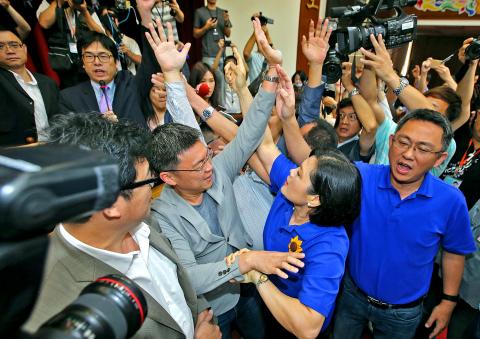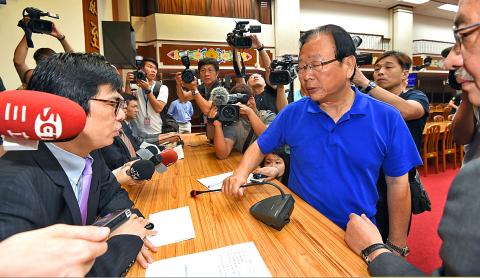Scuffles among lawmakers broke out in the legislature in Taipei yesterday as a combined session completed the final procedural step before sending draft legislation targeting “illicit party assets” into cross-caucus negotiations.
A combined session of the Legislative Yuan’s Internal Administration Committee, the Judiciary and Organic Laws and Statues Committee, and the Finance Committee on Monday passed the draft legislation after Chinese Nationalist Party (KMT) legislators stormed out of a review session at which they used extended “procedural remarks” to slow the progress of a Democratic Progress Party (DPP)-sponsored proposal.
Yesterday’s session was to confirm Monday’s meeting minutes to enable the draft act to be sent out of committee ahead of a five-day recess, including the Dragon Boat Festival, and before KMT Legislator Huang Chao-shun (黃昭順) is scheduled to take her turn in the rotation as convener of the Internal Administration Committee next week.

Photo: CNA
Members of the New Power Party caucus arrived early to prevent KMT legislators from occupying the convener’s podium — a strategy commonly used by members of the opposition to impede proceedings.
After the reading of the official rendition of Monday’s minutes, session convener Chen Chi-mai (陳其邁) — a DPP legislator — finalized the minutes while KMT lawmakers voiced objections, sparking retorts from the DPP and leading to shouting from both sides.
“We have objections — you have not let me speak about procedure,” KMT caucus Secretary-General Lin Te-fu (林德福) said, repeatedly grabbing microphones away from Chen and at one point slamming a microphone against the podium.

Photo: Liu Hsin-de, Taipei Times
Following several minutes of shouting, Chen called for a vote on a DPP motion to adjourn, leading to tussles as several KMT legislators charged the convener’s podium, with Lin wrenching the microphone away from Chen immediately after he announced the passage of the adjournment motion.
“We have a right to give procedural remarks and we registered, but they refused to give us an opportunity to express our views,” KMT Legislator Chang Li-shan (張麗善) said as her colleagues shouted slogans accusing the DPP of using “majority violence” and imposing “green terror.”
“A motion to adjourn takes priority — those are the ABCs of procedural rules,” Chen said. “The KMT should familiarize itself with procedural rules and make its opinions known during the substantive review process, rather than resorting to a flustered and reckless procedural boycott.”
Declaring whether to finalize meeting minutes is to be done at the discretion of committee conveners according to the Rules of Procedure of the Legislative Yuan, he said, adding that the regulations stipulate any objections to the wording of the documents should be submitted in writing — ruling out the use of procedural remarks.
“All of this stalling is to protect the KMT’s assets, but [KMT lawmakers] seem to think that acting as the opposition is just a matter of putting on a new uniform,” said DPP Legislator Chuang Jui-hsiung (莊瑞雄), referring to blue polo shirts and jeans KMT legislators wore at the session.
“They have forgotten to do their homework,” Chuang said, adding that former legislative speaker Wang Jin-pyng (王金平) — a KMT legislator — had issued a ruling stating that finalizing committee minutes was not subject to a vote.
The draft bill now moves to cross-caucus negotiations, with a vote expected early next month following the discussions.

CHAOS: Iranians took to the streets playing celebratory music after reports of Khamenei’s death on Saturday, while mourners also gathered in Tehran yesterday Iranian Supreme Leader Ayatollah Ali Khamenei was killed in a major attack on Iran launched by Israel and the US, throwing the future of the Islamic republic into doubt and raising the risk of regional instability. Iranian state television and the state-run IRNA news agency announced the 86-year-old’s death early yesterday. US President Donald Trump said it gave Iranians their “greatest chance” to “take back” their country. The announcements came after a joint US and Israeli aerial bombardment that targeted Iranian military and governmental sites. Trump said the “heavy and pinpoint bombing” would continue through the week or as long

TRUST: The KMT said it respected the US’ timing and considerations, and hoped it would continue to honor its commitments to helping Taiwan bolster its defenses and deterrence US President Donald Trump is delaying a multibillion-dollar arms sale to Taiwan to ensure his visit to Beijing is successful, a New York Times report said. The weapons sales package has stalled in the US Department of State, the report said, citing US officials it did not identify. The White House has told agencies not to push forward ahead of Trump’s meeting with Chinese President Xi Jinping (習近平), it said. The two last month held a phone call to discuss trade and geopolitical flashpoints ahead of the summit. Xi raised the Taiwan issue and urged the US to handle arms sales to

BIG SPENDERS: Foreign investors bought the most Taiwan equities since 2005, signaling confidence that an AI boom would continue to benefit chipmakers Taiwan Semiconductor Manufacturing Co’s (TSMC, 台積電) market capitalization swelled to US$2 trillion for the first time following a 4.25 percent rally in its American depositary receipts (ADR) overnight, putting the world’s biggest contract chipmaker sixth on the list of the world’s biggest companies by market capitalization, just behind Amazon.com Inc. The site CompaniesMarketcap.com ranked TSMC ahead of Saudi Aramco and Meta Platforms Inc. The Taiwanese company’s ADRs on Tuesday surged to US$385.75 on the New York Stock Exchange, as strong demand for artificial intelligence (AI) applications led to chip supply constraints and boost revenue growth to record-breaking levels. Each TSMC ADR represents

State-run CPC Corp, Taiwan (CPC, 台灣中油) yesterday said that it had confirmed on Saturday night with its liquefied natural gas (LNG) and crude oil suppliers that shipments are proceeding as scheduled and that domestic supplies remain unaffected. The CPC yesterday announced the gasoline and diesel prices will rise by NT$0.2 and NT$0.4 per liter, respectively, starting Monday, citing Middle East tensions and blizzards in the eastern United States. CPC also iterated it has been reducing the proportion of crude oil imports from the Middle East and diversifying its supply sources in the past few years in response to geopolitical risks, expanding